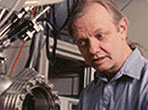|
 |
 |
|

Technical
Seminar |
 |
 |
|
Molecular Electronic Devices
|
|
|
DATE/TIME
Monday, October 28, 2002
( 4:00pm to 5:30pm)
|
|
PLACE
Glover Bldg. Rm. 201 (CSU,
Fort Collins, CO)
|
|
|
ABSTRACT
Economic and general physics
considerations indicate that the rapid improvements we have come to
expect in silicon integrated circuits may saturate around the year
2010. However, fundamental physical laws indicate that it should
be possible to compute with a power efficiency that is at least one
billion times better than present silicon electronics. The most
straightforward way currently known to achieve such efficiencies are
to fabricate circuits very much smaller than they are at
present. Thus, there is a tremendous business incentive to
invent new electronic devices and circuits that will have dimensions
of the order of nanometers. In addition, new fabrication
techniques will be required that can inexpensively produce and connect
these devices in vast quantities. In order to satisfy both
requirements simultaneously, we have assembled a trans-disciplinary
team of chemists, physicists, engineers, and computer scientists at HP
Labs to explore the use of molecules as active electronic devices. |
|
PRESENTATION SLIDES
N/A
|
|
|
DR. R. STANLEY
WILLIAMS (HP
Laboratories, Palo Alto, CA)
|

|
R. Stanley
Williams is HP Labs Fellow and Director of Quantum Science Research (QSR),
the basic research group in the physical sciences at Hewlett-Packard
Laboratories in Palo Alto, California. His research interests
are in the areas of the thermodynamics of size and shape of
nanometer-scale materials, molecular electronics, and the physics of
information. He is also an Adjunct Professor of Chemistry at the
University of California Los Angeles. Dr. Williams attended Rice
University from 1970-74, where he obtained his B.A. degree in Chemical
Physics. |
|
He attended the University of California Berkeley from
1974-1978, where he obtained his M.S. and Ph.D. degrees in Physical
Chemistry. From 1978-80, he was a Member of Technical Staff at
AT&T Bell Laboratories. He moved to the University of
California Los Angeles as an Assistant Professor in the Department of
Chemistry, and was promoted to Associate Professor in 1984 and
Professor in 1986. He joined Hewlett-Packard Labs in 1995 to
found the QSR. His awards for scientific and academic
achievement include the Dreyfus Teacher-Scholar Award, the Sloan
Foundation Fellowship, the Julius Springer Award for Applied Physics,
and the Feynman Prize in Nanotechnology. He has been an advisor
to the Defense Science Board, an advisor to the Frontier Research
Program at the Institute for Physics and Chemistry Research (RIKEN) in
Japan, and a frequent lecturer at the Pepperdine School of Business
Management. He was a co-organizer of the workshop and co-editor
of the report that led to the National Nanotechnology Initiative in
2000. |
|